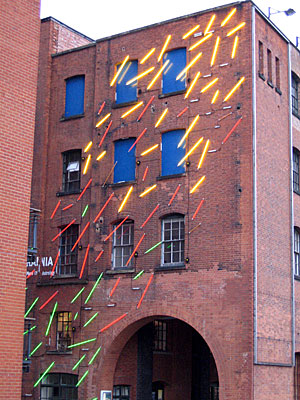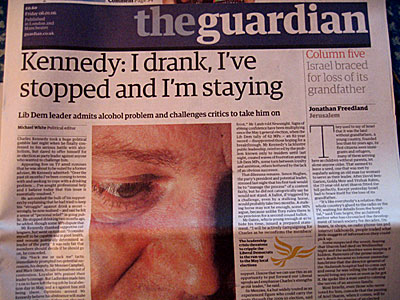Wow! Alex Tew, the genius who thought up MillionDollarHomePage, has put the last remaining 1,000 pixels on the page up for auction on eBay. I’ve just looked (Saturday, January 7, 21:50) and the current bid is over $150,000.
Iraq war ‘could cost US over $2 trillion’
From today’s Guardian…
The real cost to the US of the Iraq war is likely to be between $1 trillion and $2 trillion (£1.1 trillion), up to 10 times more than previously thought, according to a report written by a Nobel prize-winning economist and a Harvard budget expert.The study, which expanded on traditional estimates by including such costs as lifetime disability and healthcare for troops injured in the conflict as well as the impact on the American economy, concluded that the US government is continuing to underestimate the cost of the war.
The texting revolution
From Guardian Unlimited | Whatever happened to … txt lngwj:)?…
The Mobile Data Association predicts that 36.5 billion texts will be sent in the UK this year (a rise from 32.1 billion in 2005). This equates to 3.6 million messages every hour – remarkable for a technology that was launched commercially only 10 years ago.
Well, the numbers are remarkable, but the claim that SMS was launched commercially only ten years ago is baloney. SMS was built into mobile phones from the beginning. My Nokia brick-phone had it in 1988.
Living down to her name
Ms Dynamite, a singer, has been charged with assaulting a police officer who was questioning her after an incident in which she allegedly kicked the door of a night-club. But Dynamite is not, alas, her real name: she is Naomi McLean-Daley, which doesn’t have the same ring to it. I am reminded of Sam Goldwyn who, while enthusing about America’s nuclear weapons, was heard to exclaim: “That Hydrogen bomb — it’s dynamite!”
Streaked lighting

Yeah, I know it looks like a double exposure, but it’s not. It’s Art (capital A). Or, if you prefer, wacky lighting on a building on London’s South Bank.
The Google CES keynote
Ably blogged by Paul Boutin. Am I the only person on the planet who is underwhelmed? And who started that crazy rumour about a “Google PC”?
Wireless!

Neat use of Photoshop. It’s an ad for the Nikon Coolpix P-1 digital camera — which can upload pictures via WiFi.
Kennedy’s little secret
The BBC’s Political Editor writes in his Blog:
It was – people say – Westminster’s worst kept secret. I refer, of course, to Charles Kennedy’s drinking.
The implication, therefore, is that we political reporters conspired to keep it that way – a secret. Hold on a second. Not so fast. There is a big, big difference between knowing that Charles Kennedy drank a lot and knowing that he had a drink problem and was undergoing treatment.
I knew the first but certainly did not know the second. The same is true of all the political reporters I know and all but Charles Kennedy’s closest circle. I knew that Mr Kennedy sometimes drank more than he should. I could see that for myself and I heard it from those who worked closely with him.
The perfect headline

Summarises the story succinctly and comprehensively.
Quote of the day
If you want a really expensive laptop, buy a Vaio.
Sony Chairman, Howard Stringer, speaking at CES yesterday. Thanks to Paul Boutin for blogging it so brilliantly.
